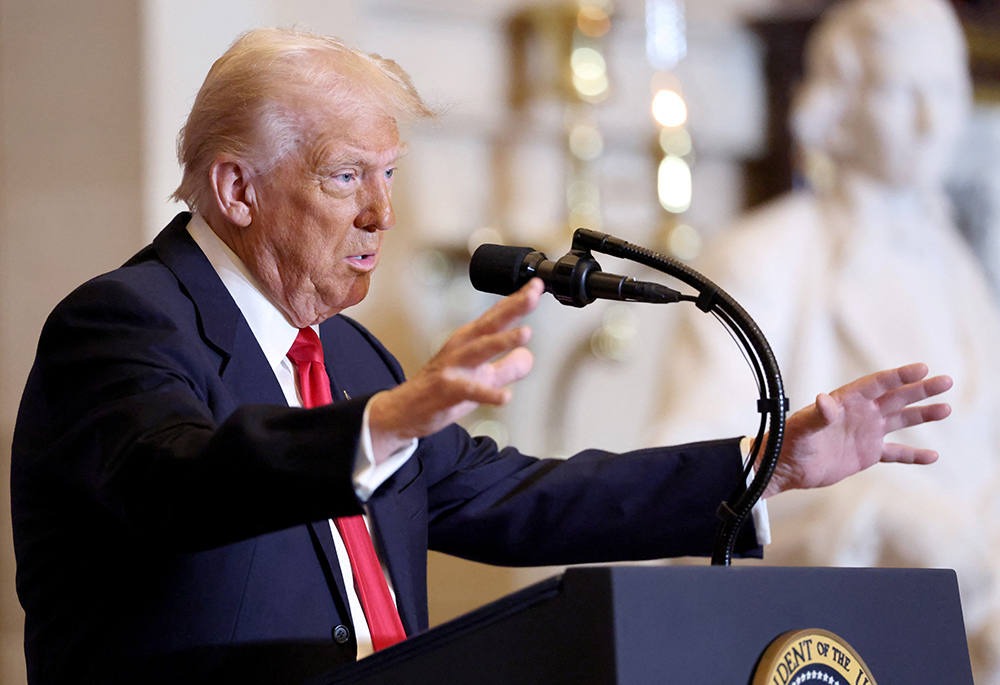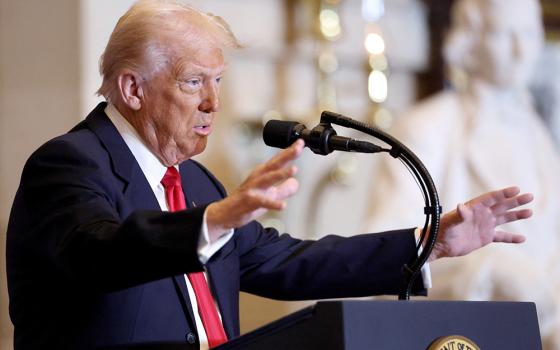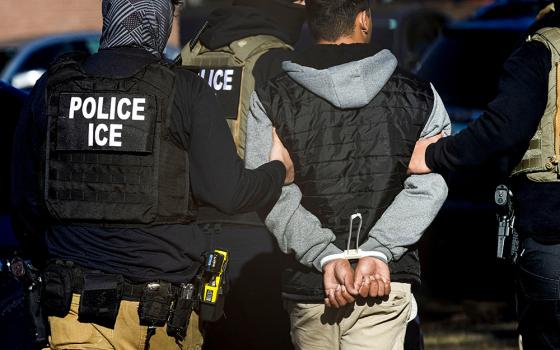
U.S. President Donald Trump speaks during the annual National Prayer Breakfast at the U.S. Capitol Feb. 6 in Washington. (OSV News/Reuters/Kevin Lamarque)
As President Donald Trump reached the 100th day of his second term April 29, polls showed decreases in his approval ratings on job performance and key issues, including among Catholics overall.
Robert Schmuhl, professor emeritus of American studies at the University of Notre Dame, who critically observes the modern American presidency, told OSV News that new presidents are typically evaluated by commentators at 100 days because "what Franklin Roosevelt accomplished during his first 100 days has become the yardstick for measuring a president's success or failure at the beginning of a term."
During that time in 1933, Roosevelt took significant action, including 15 major pieces of legislation, as he pushed forward his "New Deal" to end the Great Depression.
But Trump's wave of activity in his first 100 days has largely consisted of executive orders and other unilateral actions, including significant reductions to the federal workforce.
The White House on April 28 launched what it has cast as a weeklong celebration of Trump's first 100 days, and the president is scheduled to spend the actual day, April 29, at a rally in Michigan.
But polls showed warning signs for the administration amid its celebrations. An ABC News/Washington Post/Ipsos survey found Trump at just a 39% approval rating and 55% disapproval among all adults, the lowest 100-day job approval rating of any president in the last eight decades. In a post on his social media website Truth Social, Trump said those pollsters "suffer from Trump Derangement Syndrome" and called them "TRULY THE ENEMY OF THE PEOPLE!"
But a Fox News poll found similar results, finding Trump at 44% approval among registered voters and 55% disapproval, while Gallup's April polling found him at 44% approval and 53% disapproval.
According to a study by the Pew Research Center, most U.S. Catholics disapprove of how Trump is handling his job as president, 58% to 42%.
A closer look shows a stark divide between white Catholics and Hispanic Catholics. A slim majority of white Catholics approve of Trump at 51% to 48%, while a large majority of Hispanic Catholics disapprove at 73% to 26%.
The divide between white and Hispanic Catholics can be seen in how the ethics of Trump administration officials are rated: 49% of white Catholics rated them "excellent" or "good," with 36% rating them "poor."
But among Hispanic Catholics, only 25% rated Trump administration officials' ethics "excellent" or "good," with a 52% majority of Hispanic Catholics rating them "poor."
The study did not specify Trump's or his administration's approval rating among Black Catholics.
"In his eager willingness to slash programs, to fire federal workers, to impose tariffs and to take on key institutions such as the media, the legal profession and higher education, the president is exerting executive power in ways that trouble a significant percentage of Americans," Schmuhl said. "There's a revolutionary aspect to the first 100 days that's creating widespread uncertainty among the public."
Catholic analysts who spoke with OSV News about public perception of Trump's presidency three months into his second term were critical of some of the administration's early actions, notably on immigration issues and U.S. foreign aid.
"Every new administration adjusts agendas, yet what we are seeing has never happened before where existing and already appropriated global poverty and health program funding has been slashed and burned," Meghan Clark, a professor of moral theology at St. John's University in Queens, New York, told OSV News.
Clark, the author of "The Vision of Catholic Social Thought: The Virtue of Solidarity and the Praxis of Human Rights," pointed to the closure of the U.S. Agency for International Development, or USAID, and ongoing concern over the future of the U.S. President's Emergency Plan for AIDS Relief, known as PEPFAR, the U.S. government’s global effort to combat HIV/AIDS.
"Actions over the last 100 days have seriously diminished the status of the United States as a global partner in matters of peace, security and development," Clark said. "Colleagues across the globe have reached out lamenting that the United States is no longer able to be trusted as a partner on sustainable development or peacebuilding."
Advertisement
A dip in public approval could be tied to "chaos and confusion" from some of the administration's early actions, Kenneth Craycraft, a professor of moral theology at Mount St. Mary's Seminary and School of Theology in Cincinnati and author of "Citizens Yet Strangers: Living Authentically Catholic in a Divided America."
"From incompetent Cabinet appointments to constantly changing tariff policy, it is impossible to rely upon this administration for the stability and relative predictability that should be the hallmark of good governance," Craycraft said.
Early scandals of the second Trump administration include the apparent accidental inclusion of The Atlantic editor Jeffrey Goldberg in a Signal group chat that included top national security officials such as Defense Secretary Pete Hegseth, in which sensitive plans for a U.S. attack on Houthis in Yemen, including launch times and aircraft types, were discussed.
John White, a professor of politics at The Catholic University of America in Washington, told OSV News that Trump "hasn't really signed much legislation; it's all about the executive orders." This means many of Trump's policies can be challenged in court or undone by future presidents.
Among the first acts of his second term, Trump signed a slew of executive orders in an effort to implement his hardline policies on immigration, including seeking to change the interpretation of birthright citizenship under the 14th Amendment, an order that prompted a legal challenge.
In April, the U.S. Conference of Catholic Bishops said it would not renew its cooperative agreements with the federal government related to children’s services and refugee support after its long-standing partnerships with the federal government in those areas became “untenable.” Vice President JD Vance, the second Catholic to hold that role, also sparred with the U.S. bishops over migration policy before Pope Francis sent a letter to the bishops in support of their work seen as a rebuke of Vance's position.
Other executive orders included withdrawing from the 2015 Paris Agreement on climate, an effort to expand the use of the federal death penalty, and another directing the U.S. government to only recognize two sexes, male and female.
As a candidate for president, Trump pledged to bring about an end to the conflict in Ukraine from Russia's invasion of that country "on Day 1," but he reached his 100th day in office without having secured a resolution. Trump has also altered U.S. foreign policy norms by suggesting the U.S. should control Greenland and make Canada, its neighbor to the north, its 51st state.
The day before Trump's 100th day in office, Canada's Prime Minister Mark Carney led his Liberal Party to victory at the polls in an outcome seen as a rejection of what voters saw as Trump's threat to their sovereignty.
"In policy areas most significant to Catholics, the Trump administration has a mixed record so far," Schmuhl said. "Being pro-life is one dimension and an important one. However, curtailing international aid where it's vitally needed seems to many observers as an abandonment of life-sustaining programs."
Craycraft called the administration's early record "a mixed bag" on issues of concern to Catholics.
"The president and administration get high marks for some pro-life policy and gender-related policies," he argued, citing efforts "to protect women’s and girls’ athletic opportunities and female-only spaces." The Trump administration froze a small fraction of the federal family planning funds Planned Parenthood receives as part of its probe into diversity, equity and inclusion programs, sometimes referred to as DEI, within federal agencies.
"Similarly, there have been positive steps related to abortion policy and other pro-family initiatives," Craycarft argued. "But they need to do more and do it more aggressively. Planned Parenthood funding should have been cut off in the first days of the administration, for example. And the administration has completely failed on the issues of IVF and surrogacy. These are not secondary issues, as they go to the heart of the dignity of life, and the administration has failed miserably on these issues."
Asked about Pew's study showing a decrease in Trump's approval rating overall among Catholics, White said, "Catholics are like most Americans."
"It's 'How's the economy, how's our pocketbook? What are you doing to curb inflation?'" he said of their concerns. "And it's very clear, the tariffs are very unpopular because people recognize them as a tax," he said in reference to Trump's call for a sweeping "reciprocal tariff" policy on almost every country in the world.
Tariffs, or a tax imposed by a government on imported goods, will raise consumer prices on many products, economists project, while some economists also predict they could lead to a recession.
A recession, White said, would likely be difficult for Trump to overcome in public opinion.
"If you go back to the Biden administration, Afghanistan was a real turning point in the public's mind, he never really recovered from that," White said in reference to a chaotic withdrawal of U.S. forces from that country. "Is Trump at that same point? And the jury's out ... but I think it's not recoverable, particularly if we slip into a recession."
Craycraft similarly cited tariffs as a large factor in the dip in approval.
"People do not like erratic, unpredictable governance, even when they approve of policy positions and initiatives," he said. "The tariff fiasco has caused fear and indecision in the markets and on Main Street. This has driven down his poll numbers."







